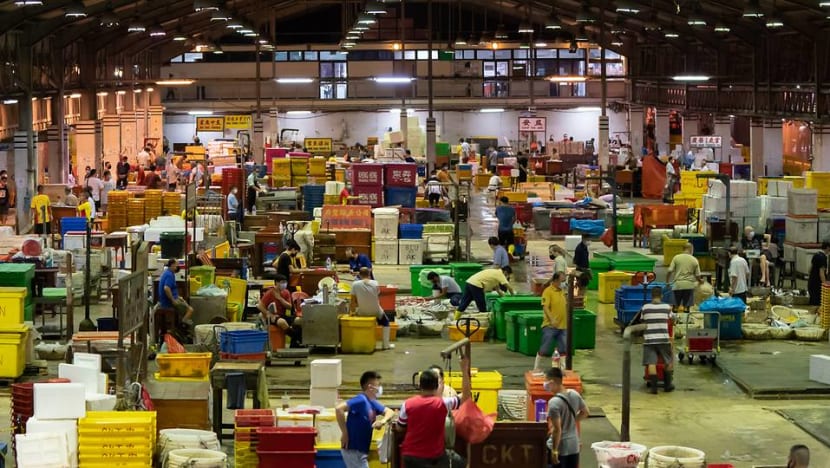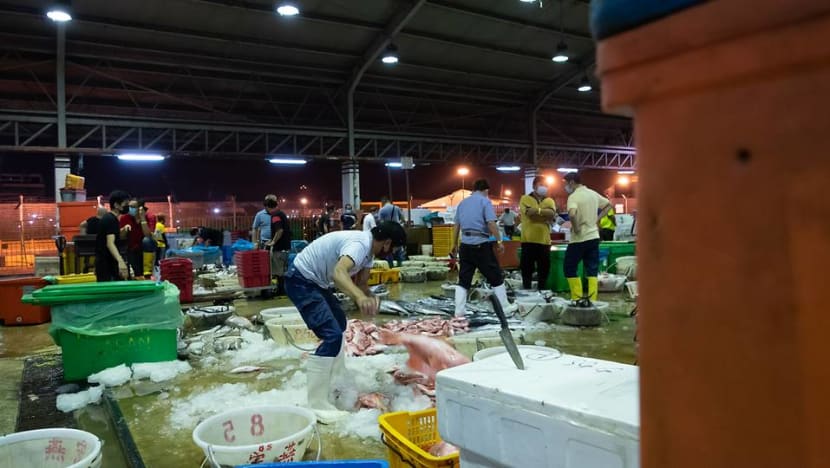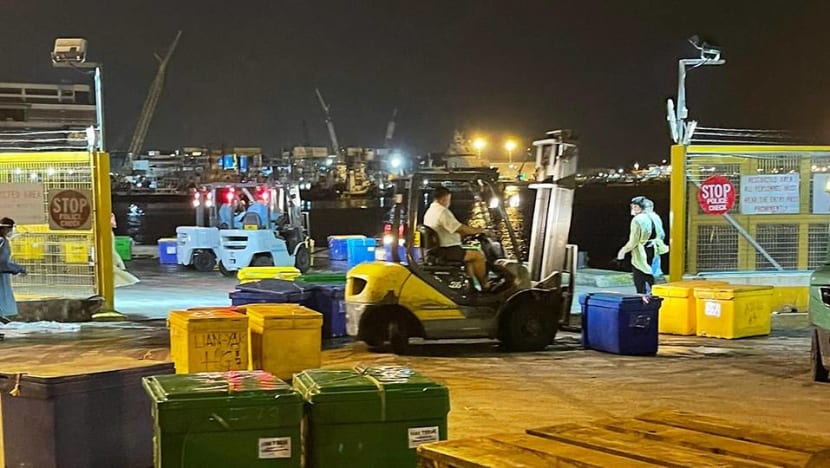Tenants at Jurong Fishery Port see fewer customers as port reopens after two-week closure

The marketplace at Jurong Fishery Port on 3 Aug 2021. (Photo: Ministry of Sustainability and the Environment)
SINGAPORE: It was a quiet start for Jurong Fishery Port on Tuesday (Aug 3) morning, as wholesale and unloading activities resumed after a two-week closure.
Just half of the port’s usual customer pool have returned, stallholders told CNA.
Mr Jason Lim, who owns four stalls at Jurong Fishery Port, said customers trickled in and out throughout the morning, but in smaller numbers.
“It’s still manageable, in terms of customer volumes, but (if it keeps up) as time goes by, it’ll be harder (for us),” said Mr Lim.

But even as port activities resumed, not all stalls reopened for business on Tuesday.
Mr Lim estimated that only 30 to 35 per cent of workers and tenants have returned.
Several tenants CNA spoke to said they are still under quarantine, as they had tested positive for the COVID-19 virus last month.
“We're just waiting for the Ministry of Health to give us more details on our discharge, so at this point, a lot of things are still unknown,” said one of tenants, who declined to be named.
“We also can’t reopen for business because most of our staff members are also under quarantine,” the tenant added.
READ: ‘A lot of confusion’ for stallholders and fishmongers as stalls remain closed with COVID-19 testing under way
The port had been closed since July 17, after MOH announced seven COVID-19 cases linked to the new cluster Jurong Fishery Port/Hong Lim Market and Food Centre the day before.
A week later, the number of infections tied to the cluster swelled to more than 740.
A growing number of COVID-19 cases were also linked to wet markets and food centres which authorities said were "likely seeded" by fishmongers who visited Jurong Fishery Port to collect their stock for sale at markets and food centres.
As of Monday, there were 1,072 cases linked to the Jurong Fishery Port/Hong Lim Market & Food Centre cluster, which remains the largest active cluster in the country.
Prior to the port’s reopening, the Singapore Food Agency said it had conducted two rounds of deep cleaning, including disinfecting the tenants' offices.
COVID-19 measures, such as restricting access to the marketplace as well as mandatory testing for those entering the ports, have also been introduced to reduce the risk of another viral transmission at the port.
Sustainability and the Environment Minister Grace Fu and Minister of State Desmond Tan visited the port on Tuesday morning.
Ms Fu said tenants have been cooperating with authorities on the new measures.
The vaccination rate among those working at Jurong Fishery Port is also high, with 80 per cent of stallholders and workers fully vaccinated and 88 per cent receiving at least one dose, she said.
Ms Fu urged all stallholders and workers to be vaccinated to keep themselves and customers safe.
"It's the joint responsibility of everyone, the shareholders, the workers, the trade visitors that will ensure the resilience of (Jurong Fishery Port) and we hope that the entire industry will help us to continue to work together and collaborate so that we can keep our food supply resilient and safe."
CONCERNS OVER DELAYS
Ms Fu added that the Singapore Food Agency was also in close discussion with tenants at the port, as they adjust to new measures.
The enhanced measures have led to growing concerns among fishmongers and merchants about potential delays in receiving their supplies.
Mr Lim said he had informed his usual customers to arrive earlier to avoid long queues at the entrance due to stringent checks.
“I told them to just come earlier to prevent any hiccups because just by entering the port itself, it’s a lot more troublesome because (the authorities) need to identify who are the right people to enter and who are not,” said the director of Kiang Huat Sea Products.
Under the enhanced measures, only authorised entry pass holders who have undergone testing and tested negative for COVID-19 will be allowed to enter the port.
“It’s not convenient and very strict, I had to take the COVID-19 test before I entered and (from now), I have to take it once a week,” said Mr Lim Chor Boon, who owns a wet market stall at Bedok South Market and Food centre.
Meanwhile, new restrictions aimed at reducing contact between foreign workers and those working at the wharf and unloading area could hit fishmongers with further delays.
All unloading activities are currently being supervised by safe distancing ambassadors and will also be monitored via closed-circuit television.
Workers at the port can only pick up the goods once the foreign workers move away from the demarcated unloading area and the crates have been disinfected.
The new process could set things back by an hour or two, estimated Mr Jason Lim.
He added that he had advised his usual supplier from Indonesia to leave two hours earlier, in order to avoid delays.
“Last time, our practice was that when the vessel arrives, (the foreign workers) would unload the fish and we would use a forklift to collect it ourselves, but now, the boxes must be disinfected and someone else will forklift it up,” he said.
“It really takes a long time, but we cannot do anything, we just have to wait at the side,” he said.

Another concern, Mr Lim said, is that the people collecting the fish might not be as experienced as his own workers.
“I don’t know how experienced they are because forklifting fish containers may be quite different from forklifting things in other sectors,” he said.
“Dropping a whole entire container into the sea is one possibility and it’s something I’ve asked the authorities because somebody has got to bear the consequences or costs if it happens.”
Mr Eitan Teo, the vice chairman of the Singapore Fish Merchant’s General Association, told CNA that the association is currently working with the Singapore Food Agency (SFA) to see whether the enhanced measures can be improved to make it more convenient for those entering the port.
BOOKMARK THIS: Our comprehensive coverage of the COVID-19 pandemic and its developments
Download our app or subscribe to our Telegram channel for the latest updates on the coronavirus outbreak: https://cna.asia/telegram












